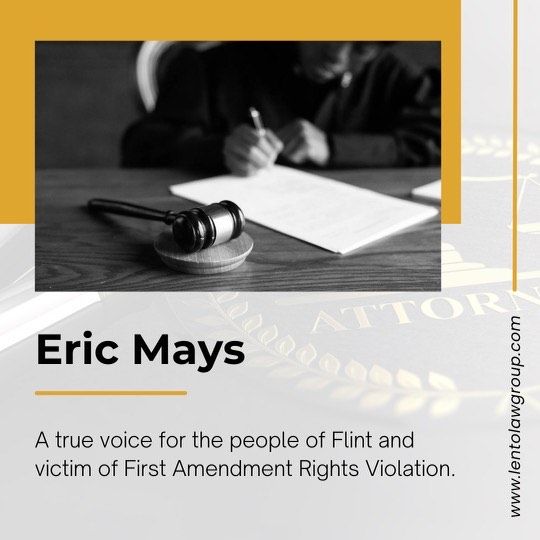Eric Mays……. A true voice for the people of Flint and victim of First Amendment Rights Violation

As the ancient Greek political philosopher Plato wrote in his seminal work, the Republic, “One of the penalties for refusing to participate in politics is that you end up being governed by your inferiors.” It is a sentiment that is as true today as it was in the days of ancient Greece.
Today, however, in the city of Flint, Michigan, there is a politician who is trying to participate in the political process – trying to be a voice for the people he was elected to represent – but who, unfortunately, is being denied the opportunity to do so by some of those very “inferiors” that Plato wrote about. That brave politician is Flint City Councilman Eric Mays.
Mays was first elected to his seat on the Flint City Council in 2013, winning his election over candidate Anita Brown to represent the City’s 1st Ward. The 1st Ward is located to the far north of Flint, roughly from Clio Road to the west to Saginaw Street to the east, and from Carpenter Road to the north and Person Road to the south. Four years later, Councilman Mays defeated Brown a second time.
In 2021, Councilman Mays was re-elected for a third term.
Despite Councilman Mays’ clear popularity with his Genesee County constituency, Mays is far less popular with many of his fellow City Councilmembers. Councilman Mays has repeatedly faced censorship from his fellow Councilmembers, with the Council even going so far as to refuse Mays reentry into the Council meeting chamber after excusing himself to use the lavatory.
This unjust censorship of Mays came to a head just over a year ago, on April 25, 2022, when he was ordered to leave a City Council meeting by Council President Allie Herkenroder, after she claimed he had left his seat and returned without permission. Mays was subsequently removed from the meeting by police who escorted him from the meeting in handcuffs.
Mays was subsequently charged with a disorderly conduct misdemeanor in connection with the event, however, even the Genesee County 67th Judicial District Court Judge Vikki Bayeh-Haley who sentenced Mays stated during the sentencing that, “He was right. He did have the right to stay in [his] seat. The City Council made the wrong ruling.”
Despite Council President Herkenroder claiming that Councilman Mays left his seat and attempted to return without permission, video from the City Council meeting showed that Mays specifically asked Herkenroder if he could be excused.
“May I ask to be excused? Because you won’t get the pleasure of throwing me out,” Mays asked.
“Yes, you may be excused,” Herkenroder replied.
Given the exchange, Judge Bayeh-Haley remarked at the sentencing that, “Whether [President Herkenroder] intended to lie or was mistaken... [Mays] did have permission to leave and return.”
About the Flint City Council, Judge Bayeh-Haley remarked, “Ideally, I would like to have some type of coach or person come in and work with the entire council to try to teach them how to work together. It would be nice if they could do that on their own.”
But “working together” does not appear to a primary objective for many of the members on the Flint City Council, including members Ladel Lewis, Judy Priestley, Eva Worthing, Dennis Pfeiffer, and Council President Herkenroder, who continue to attempt to censor Councilman Mays.
Last month, in March 2023, Councilman Mays decided to take action. Realizing that the silencing of his voice by his fellow Councilmembers was really the silencing of the hundreds of voices of his constituents, Councilman Mays retained our office, Lento Law Group, P.C., to combat this unjust and unconstitutional abridgement of not only his First Amendment rights, but the ongoing disenfranchisement of those citizens of the 1st Ward whom Mays has been repeatedly elected to represented.
Most recently, Councilman Mays is leading the charge to compensate those in Flint who have suffered property damage and loss as a result of the City’s long-standing sewage backup problem. Mays plans to bring forth a Resolution which will expedite the claims process and ensure sufficient funds are held in reserve to continue to pay damage claims in connection with the ongoing sewage backup issue.
This is just one of the ways in which Council Mays is fighting for the people of Flint, not just within the 1st Ward, but overall. Even so, his fellow City Councilmembers seem intent on continuing to try to shut Mays down at every turn.
But in retaining Lento Law Group, P.C. – which only last month sent Cease & Desist letters to several of the City Councilmembers who have been repeatedly and flagrantly encroaching on Councilman Mays’ rights – Councilman Mays is making perfectly clear that the battle for the soul of Flint has only just begun, and he has no intention of backing down.
More News & Resources











